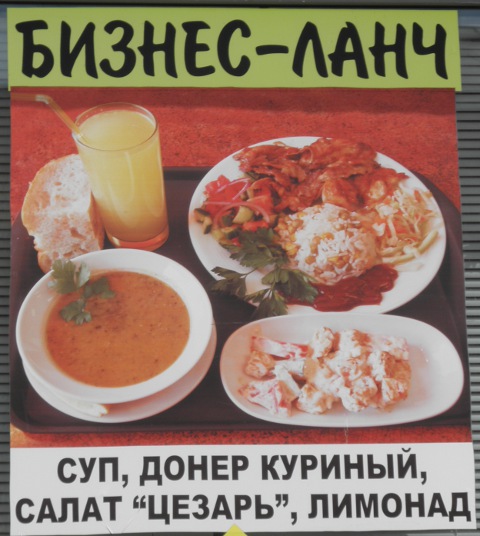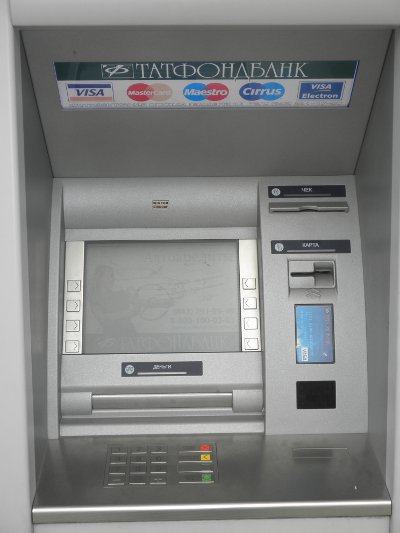Бывать
Every beginning Russian student knows that the verb быть means 'to be,' and that in the present tense the verb is generally not used, thus we have sentences like:
| Кира сейчас в Москве. | Kira is in Moscow right now. |
Eventually we learn that there is a second verb 'to be,' which is бывать. The -ва- suffix in Russian sometimes forms what we call a frequentative verb, one that indicates that the action happens on more than one occasion. Thus we can have sentences like:
| Кира бывает в Москве. | Kira is sometimes in Moscow. |
The verb is perfectly regular, just like читать, so you'll have no trouble conjugating it. In terms of translation style, though, you may often find yourself making non-literal substitutions. For instance:
| — Иван бывает в Москве? — Да, бывает. |
"Is Ivan in Moscow sometimes?" "Yes, he is." |
While that is a perfectly grammatical translation, it really doesn't capture what an English speaker would say in a similar situation. For a good flow it is better to substitute motion phrases and add some typical functional words:
| — Иван бывает в Москве? — Да, бывает. |
"Does Ivan ever come to Moscow?" "Yes, he does." |
The 'go' version works as well:
| — Иван бывает в Москве? — Да, бывает. |
"Does Ivan ever go to Moscow?" "Yes, he does." |
If you include some other adverb of frequency, then don't include the word 'sometimes':
| Я редко бываю в Париже. | I don't go to Paris very often. |
| — Как часто у вас бывают грозы? — В августе они бывают почти каждый день. |
"How often do you have thunderstorms?" "In August we have them almost every day." |
| — Мы вчера увидели розового слона. — Розовых слонов не бывает. — Да что ты. Это была реклама в виде надувного розового слона. — Ах, понял. |
"Yesterday we saw a pink elephant." "There's no such thing as pink elephants." "Don't be silly. It was an inflatable pink elephant used for advertising." "Oh, I get it." |
| — У вас есть чёрный хлеб? — Бывает. — Дайте, пожалуйста, две буханки. — Я сказала, что бывает. Сегодня нету. |
"Do you have rye bread?" "Usually." "I'd like two loaves, please." "I said that we usually do. Today there isn't any." |
Бизнес-ланч
As weird as this sounds, sometimes it's the English words in Russian that confuse me, not the Russian words. For instance, all over Kazan these days there are signs on restaurants that read Бизнес-ланч "Business Lunch." "What the heck is that?" I ask the locals. They look at me as if I am an idiot and say, "Those are English words. You should understand them." Well that's just it. I do understand them. In the US a business lunch is a lunch where you do business. It's not the name of an item on a menu.¹
Nowadays in Russia a бизнес-ланч is essentially a particular menu offered at a fixed price. No substitutions, please. I think the best translation for it may be "lunch special" or what some menus lable a prix fixe meal. One of the many restaurants in Kazan that offer such meals is called "Meat House."
My students love this place because you can get meat without mayonaisse or sour cream on it. What? No mayo or sour cream, you say? It can't be run by Russians then. You are correct: the food is prepared by Turks. I was interested in the meal represented on this ad:

They offered it for 149 rubles, which is about 5 bucks. I decided to try it. How well did it match the advertisment? You be the judge:

The drink is lemonade. The lentil soup could have used a bit more salt. The bread was good, but I'm not a fan of bread. The donair (Canadian spelling) is finely shaved chicken accompanied by rice and some cabbage, and the salad is made half of croutons and half of vegetables tossed in what the Russians consider a Caesar sauce, but it doesn't have the sardine flavor that an American Caesar Salad requires. Here are some sample sentence:
| — В кафе «Нептун» предлагают вкусный бизнес-ланч с морепродуктами. Не пойдёшь со мной? — Нет, я не люблю рыбу. |
"At the Neptune Cafe they offer а delicious seafood lunch special. Do you want to go with me?" "No, I don't like fish." |
| — Какой у вас сегодня бизнес-ланч? — С курицей или с мясом. |
"What's your lunch special today?" "You can have chicken or meat." |
| — Почему вы не принесли мне суп? — В нашем бизнес-ланче нет супа. — Да что вы. Бизнес-ланчей без супа не бывает. — А у нас бывает. Посмотрите на рекламу. Там нет никакого супа. |
"Why didn't you bring me soup?"' "Our lunch special doesn't have soup." "Oh, come on. There's no such thing as lunch specials that don't have soup." "There is here. Look at the ad. There isn't any mention of soup." |
| В кафе «Мит Хаус» очень вкусные блюда. Я часто туда хожу за бизнес-ланчем. | "Meat House" has really delicious food. I often go there for the lunch special. |
Business lunches, in the sense of lunches where you do business, are vital in the US. When I was preparing this blog-entry, I came across a business-lunch link from Microsoft. Apparently they consider it important enough to give some basic guideliness for the event. Read it here for your amusment.
One last grammatical comment: бизнес-ланч is a phrase that is currently in a grammatical no-man's land. Although most people decline it, as a foreign phrase it is sometimes not declined by others. The orthographic dictionary at gramota.ru treats it as declineable, so that's the best approach for a foreigner to use. In the case of the examples above, one of my current native-speaker informants sometimes declined it and sometimes didn't. If it disappoints you that the Russian language is sometimes inconsistent, then you must take advice from about 2 minutes 5 seconds into the sword fight in The Princess Bride: "Get used to disappointment."
¹ Well, this not necessarily 100% true. Probably there are some restaurants somewhere in the US that have "business lunch" written on their menu. My point here is that "business lunch" in the sense of a particular meal selection for a particular price is not a standard phrase in American English.
Платёжный терминал
One of the slickest aspects of Russian life these days are certain machines in public places that look sort of like bank machines, but their main purpose is rather the opposite: instead of disbursing money to the person who walks up, they take money from the customer which is then applied to bills. You can pay for your cell phone at these places. You can pay for your internet services. You can pay for water and electricity. You can sometimes even deposit money into your bank accounts through them. It's pretty simple. You walk up. Choose the service you want to pay. Enter your account number. Stick in some cash. Take your receipt. Voilà, you're done!
Officially such a machine is called a платёжный терминал "a payment terminal." You can find them in the subway. You can find them in the underground pedestrian paths under big streets. Heck, you can even find one at the 24-hour fast-food place not a block from where I'm staying. Despite the official name, sometimes people simply call them автомат "automated machine" or sometimes even more sloppily банкомат "bank machine." In either case, they are incredibly convenient. Payment via internet is still not quite as common in Russia as in the US, and it seems like everybody pays for their cell phones mainly at these terminals. Lots of services in Russian, like many cell phone plans, aren't fixed monthly sums. They are pre-paid services, and as your pre-paid account gets low, you need to go to one of these machines to add money to your account, otherwise they'll shut your service down so fast your head will spin. And mind you, young Russians these days send text messages like they were going out of style. I don't think a Russian under 30 can even develop a relationship without text-messaging, so you can imagine that these machines are a vital part of their daily lives:
| Блин! Деньги кончились на счету. Мобильник перестал работать. Надо бы сейчас же пополнить счёт через терминал. | Fudge! My account's out of money. My cell phone stopped working. I need to add money to my account right away at a payment terminal. |
| Я только что пополнила счет. В терминале сказали ожидать обработки денег в течении дня. Ждать целый день? По-моему, это не так уж удобно. | I just added money to my account. The terminal said to expect the money to be processed within a day. Wait a whole day? I don't think that's all that convenient. |
| Борис подошёл к терминалу и пополнил счёт интернета. | Boris walked up to a terminal and added money to his internet account. |
| Не примирюсь с этими проклятыми терминалами. Я уверен, что когда-нибудь один из них достигнет самосознания, превратится в терминатора, и сделает нас всех рабами. | I will not reconcile myself to those damned terminals. I'm sure that someday one of them will achieve self-awareness, turn into a terminator and make slaves of us all. |
Справа
One of the words you use in Russian to describe where something is located is the adverb справа, which can be translated "on the right" or "on the right-hand side." When you experience your first Russian-language tours in Russia, your tour guide will certainly use the word in phrases like this:
| Справа находится Зимний дворец. | On the right-hand side is the Winter Palace. |
| Справа вы увидите Исаакиевский собор. | On the right you will see St. Isaac's Cathedral. |
To express the concept "to the right of," you add the preposition от followed by the genitive case:
| Справа от банка находится ресторанчик. | To the right of the bank there is a little restaurant. or A little restaurant is located to the right of the bank. |
| Справа от Кати сидит Ванька. Он такая свинья, не заводи с ним разговоры, а то пожалеешь. | Sitting to the right of Ekaterina is Ivan. He is such a pig. Don't start talking to him or you'll regret it. |
Although справа can be used to indicate location, the word can also mean "coming from the right" or "from the right" or "from the right side":
| Незнакомая девушка подошла ко мне справа, и, к моему удивлению, онa подсунула мне свой телефон. | A girl I didn't know approached me from the right and, to my surprise, slipped me her phone number. |
| Слева было несколько ям, по-этому скорая помощь подъехала справа. | There were some potholes on the left, so the ambulance approached from the right-hand side. |
Банкомат
The word for bank machine or ATM in Russian is банкомат. Back in the 80s there were essentially no banks in Russia in the sense of an ordinary bank in the US. Nowadays they are everywhere. And one of the chief ways to interact with a bank is through a bank machine:

| Я взяла две тысячи рублей в банкомате. | I got two thousand rubles from the ATM. |
| Мне нужны были деньги, но банкомат не работал. | I needed money, but the ATM wasn't working. |
| Не подскажете, где ближайший банкомат? | Could you tell me where the nearest bank machine is? |
| Я подошёл к банкомату, но в нём не было денег. | I went to the bank machine, but it was out of money. |
Just as in the States, to get money from an ATM you need a bank card банковская карта. Usually people will call it simply a карта, and sometimes they will call it кредитная карта. (Usually a bank card in Russia participates as well in the Visa or Mastercard system.) You also need a PIN number, which the Russians usually simply call a код, although it is also called ПИН-код (usually the first part is spelled with English letters, thus PIN-код) or личный код "personal code."
| Я всунул карту в банкомат, но он сразу же вернул её. | I put my card in the bank machine, but it immediately gave it back. |
| Я набрал свой код и проверил баланс. | I entered my PIN number and double-checked my balance. |
Just as in the States, a bank machine usually belongs to a particular bank. If you use ATMs owned by that bank, there are usually no withdraw fees. If you use one out of their system, there are:
| Я держу счёт в Сберанке России, и поэтому я пользуюсь только его банкоматами. | Sberbank Rossii holds my account, so I use only their bank machines. |
| Когда я пользуюсь банкоматами других банков, они берут проценты. | When I use ATMs that belong to other banks, they charge extra. |
That last example is interesting. «Берут проценты» really means "they charge a percentage." We Americans would expect that they charge a commission «берут комиссию», and that the commission would be a fixed fee. The commission in Russia is often not a fixed fee, but rather a percentage of the withdrawal, sometimes with a minimum amount of, say, $5. In this case phrase "they charge extra" is not a precise or technical translation of «они берут проценты». Instead it is a substitution of the most common English phrase used in that context for the most common Russian phrase used in the similar context.
<< 1 ... 56 57 58 ...59 ...60 61 62 ...63 ...64 65 66 ... 158 >>
